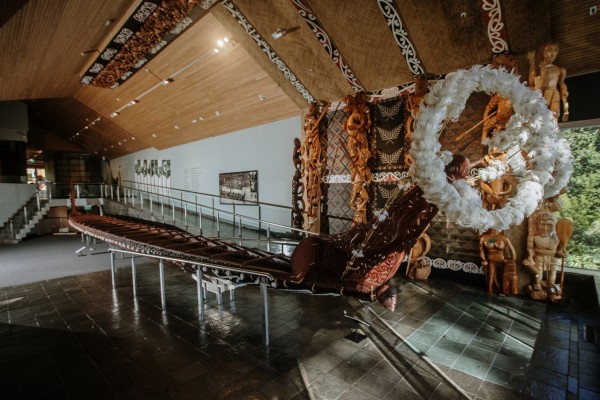50 years of majestic waka at Waikato Museum
6 July 2023

Kia hora te marino, kia whakapapa pounamu te moana, kia tere te kaarohirohi i mua i too huarahi.
May peace be widespread, may the sea glisten like greenstone, and may the shimmer of light guide you on your way.
The majestic 200-year-old waka, Te Winika, celebrates 50 years of residence at Waikato Museum Te Whare Taonga o Waikato this weekend (8 July).
Te Winika was gifted to the city of Hamilton on 8 July 1973 by Te Arikinui Dame Te Atairangikaahu, monarch of the Kiingitanga. It’s estimated that millions of visitors have seen the intricately carved waka taua (Maaori war canoe) since Waikato Museum became kaitiaki (guardian) of Te Winika.
Liz Cotton, Director of Museum and Arts said Te Winika is the heart of the Waikato Museum.
“She is prominently positioned with a view over the Waikato River, to keep alive her connection to te awa tuupuna (the river) and iwi (the people). Te Winika is admired by every visitor who comes here, whether they are tangata whenua with whaanau connections to Te Winika, or an overseas traveller eager to learn about our unique heritage,” said Cotton
“Te Winika was gifted to Hamilton city as a gesture of harmony and goodwill by the Kiingatanga’s longest serving monarch, Te Arikinui Dame Te Atairangikaahu. The mayor at the time, Mike Minogue, stated that ‘Te Winika … is a reminder how we should really live our lives. She will live forever in a proud and central place in the city of Hamilton’. For the last fifty years, Waikato Museum has proudly served as the kaitiaki of this precious gift, and we look forward to sharing her story, including her wonderful years with us, with future generations too.”
On Saturday 8 July, the short film Te Winika Memories along with rarely seen images from Te Winika’s final journey on the awa, will be screened next to Te Winika.
Cotton shared that more celebrations of the anniversary are to come.
“We are looking forward to continuing to honour Te Winika as we celebrate her 50th year residing here at Te Whare Taonga. She is such a significant part of our Museum whaanau and an ongoing source of inspiration and wonder for all of our visitors.”
The history of Te Winika is encapsulated in the experiences of the Tainui people. In 1836 a massive tootara tree that stood near Port Waikato was felled to create the kaunaroa (central hull) for the waka taua, which was collectively built by craftspeople from Ngaati Tipa of Tuakau, Ngaati Maru of Hauraki, and Ngaati Maahanga of the western coastline of the Waikato.
In the fork of the tree grew a type of orchid known as ‘te winika’ which blooms with masses of white and green star-shaped flowers, evoking the huia feathers worn by high ranking rangatira (chiefs). This led to the auspicious name being given to the waka taua, that served Maaori royalty for many purposes, from transport to ceremonial duties.
Following the 1863 invasion of the Waikato and the tumultuous era of the New Zealand Land Wars, Te Winika was dismantled and hidden to avoid destruction by Imperial and colonial troops. In the following century, she was restored and became a symbol of the Kiingatanga, thanks to the Waikato waka renaissance lead by Te Puea Herangi during the 1930s.
On 8 July 1973 Te Winika embarked on her final voyage up the Waikato River, escorted by other waka taua from the Kiingitanga: Tuumanako, Te Rangatahi, and Taaheretikitiki II.
Council’s kaumatua, Tame Pokaia celebrates this milestone, and recalls the coming together of expert carvers to restore Te Winika for her final journey.
Pokaia said “Te Winika is a powerful symbol of our connection to each other and the Kirikiriroa. Kotahi te koowhao o te ngira e kuhuna ai te miro maa, te miro pango, te miro whero – there is but one eye of the needle, through which the white, the black and the red threads must pass. I remember the words of Te Arikinui Dame Te Atairangikaahu, that we must look after the needle that binds us together, so it doesn’t get rusty.”
This historic event was recorded with film slides which will be on display this weekend, and was revisited in 2009 for the creation of Te Winika Memories, a 10 minute video of interviews with Tikitiki Green, Hikairo Herangi, Rawerawe Herangi, and Leo Muru, which will also be screening.
Waikato Museum is open every day from 10am to 5pm (except 25 December) and entry is free.
Please note:
For te reo Maaori, Waikato Museum uses double vowels (uu) in place of vowels with a macron (ū) to represent a long vowel sound. This spelling approach is the preference of tangata whenua in Hamilton Kirikiriroa and Waikato iwi for te reo Maaori words. Artists’ titles are shown in their original form.

